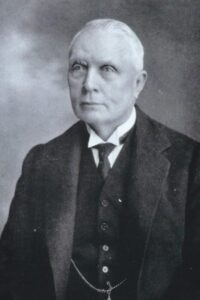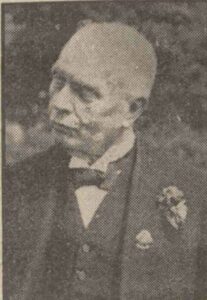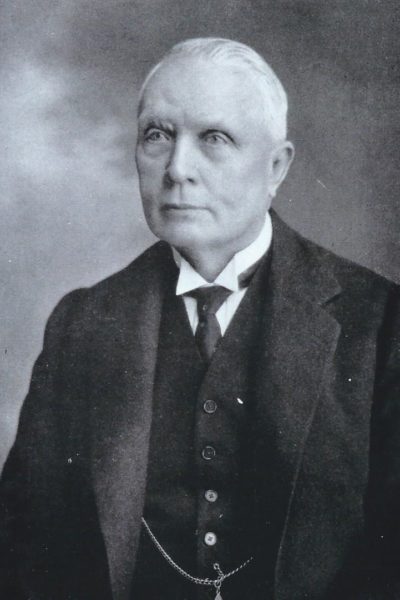
George Norman
Image Source: Bath Freemasons
George Norman M.R.C.S. L.S.A. (c. 1849 – 7 November 1938) was an homeopathic surgeon, antiquarian, churchman, and Freemasonic scholar, who spent his entire career in Bath, Somerset. He was elected a member of the British Homeopathic Society in 1876.
Norman and his wife, Mary, were both connected with the Bath Homeopathic Hospital, founded in 1859. George Norman was one of the medical officers and served on the hospital committee, while Mary was involved in running the Ladies Group.
Norman’s colleagues at the Bath Homeopathic Hospital included Samuel Morgan, George Newman, John Pitney Aston, Edward Christopher Holland, John Hamilton Mackechnie, and Percy Roberts Wilde.
George Norman studied medicine at St George’s Hospital in London and the University of Edinburgh. He was elected a Member of the Royal College of Surgeons, aged 21, and the following year, 1871, was awarded the diploma of the Worshipful Society of Apothecaries.
Norman settled in Bath in 1876, where he remained in practice for the next forty-six years.
In 1879, Norman married Edinburgh-born Mary Louisa Cruickshank (1850 – 1946). The Normans resided at 12 Brock Street, Bath.
Norman and Mary were both involved with the Bath Homeopathic Hospital. George Norman was appointed as one of the medical officers and also served on the hospital committee, while Mary was involved in running the Ladies Group.
George Norman was an active participant in the homeopathic community. In July, 1881, he was one of the attendees at the International Homeopathic Convention held at Aberdeen House, Argyle Street, in London.
In 1888, Norman joined fellow homeopath John Hamilton McKechnie on the Medical staff at the new Hahnemann Free Dispensary that they had established at 2 Abbey Street, Abbey Green. The Dispensary was later situated at Hartley House, Manvers Street.

George Norman
Image Source: Bath Chronicle and Weekly Gazette
George Norman was an active participant in the municipal life of Bath. He was a member of the Christ Church congregation, and in 1910 was elected President of the Church Institute, located in the town’s Edgar Buildings.
In 1886, Norman was elected as a member of the Bath City Council. He would serve on the Council for sixteen years and in 1911 was appointed to the Baths sub-committee tasked with investigating the therapeutic properties of the baths. Norman was also instrumental in the creation of the Bath Botanical Gardens in Victoria Park.
Norman was also a leading Freemason. He was initiated into the Bath Royal Cumberland Lodge in 1889. In June 1917, Norman was honoured by being appointed Past Assistant Grand Director of Ceremonies of England by Grand Master, the Duke of Connaught, in front of eight thousands Freemasons at the 200th anniversary gathering held at London’s Albert Hall.
His Masonic career was exceptional and he enjoyed high office in a number of other Degrees and Orders. He was the Lodge Secretary of Somerset Masters for the first seven years and one of the joint Editors of the Transactions. He was very keen on Masonic research; became a prolific contributor to the Transactions of the Lodge; was invited to join the prestigious Quatuor Coronati Lodge and became its Master in 1923.
In 1925 the Bath Masonic Hall was refurbished, with a new Masonic Library on the second floor and a small Museum on the third floor, both made possible by Norman:
The Museum and Library were both created from the collections donated by George Norman, an eminent local Masonic historian, and were also named after him. Unfortunately, the majority of the Museum collection was lost in April 1942 when the building next door received a direct hit during the Baedecker raids on the City. That building was completely destroyed, along with part of the party wall where the Museum was located, and fire quickly spread into the roof of the Masonic Hall. This was brought under control, but not before seriously affecting the Temple ceiling. Fortunately the furniture and equipment together with the Library, which was located at the other end of the building, survived virtually unscathed.
George Norman died on November 7, 1938. His obituary is in the The Gloucestershire Echo, Thursday November 10, 1938, page 7, and in the Bath Weekly Chronicle and Herald, Saturday November 12, 1938.



Leave A Comment